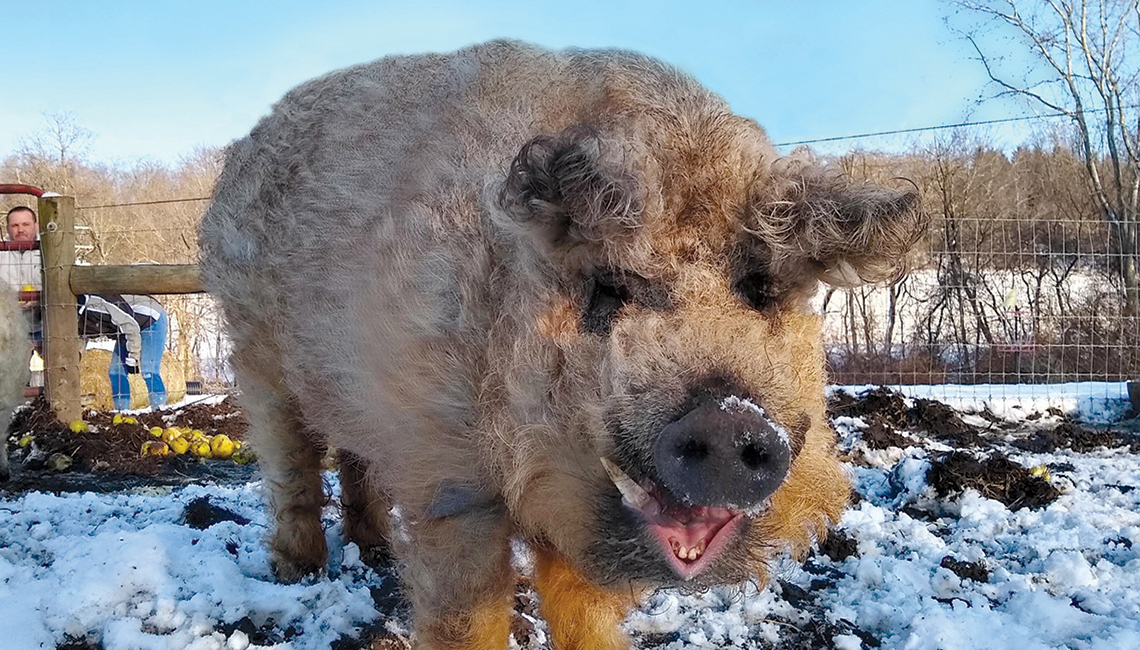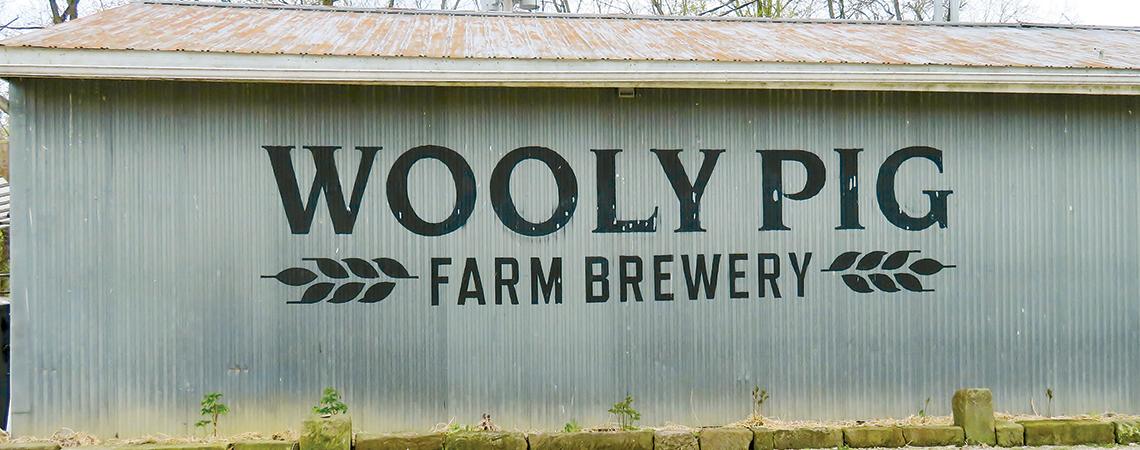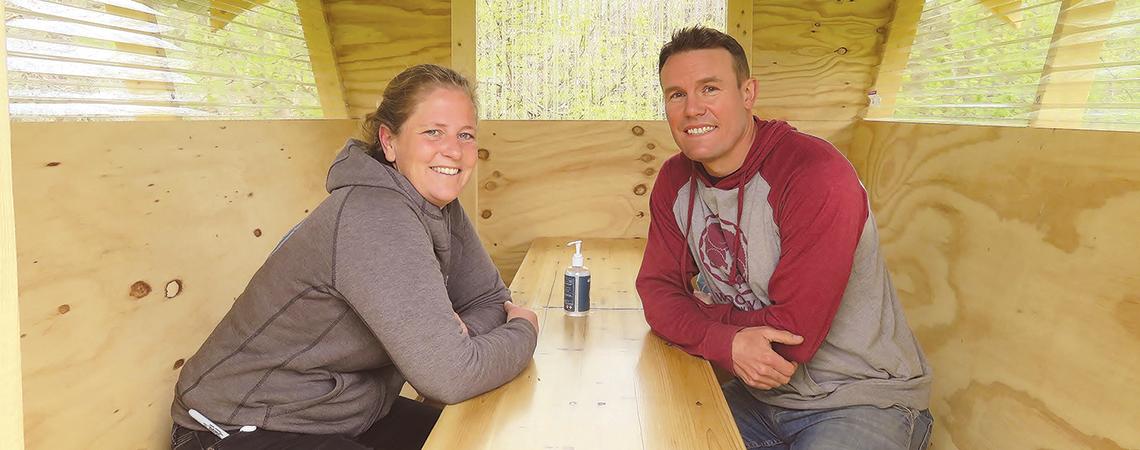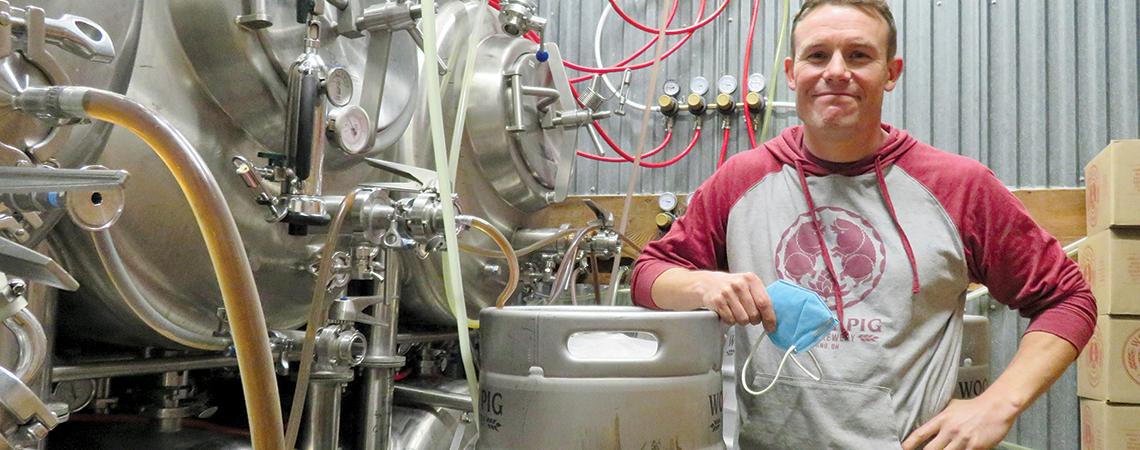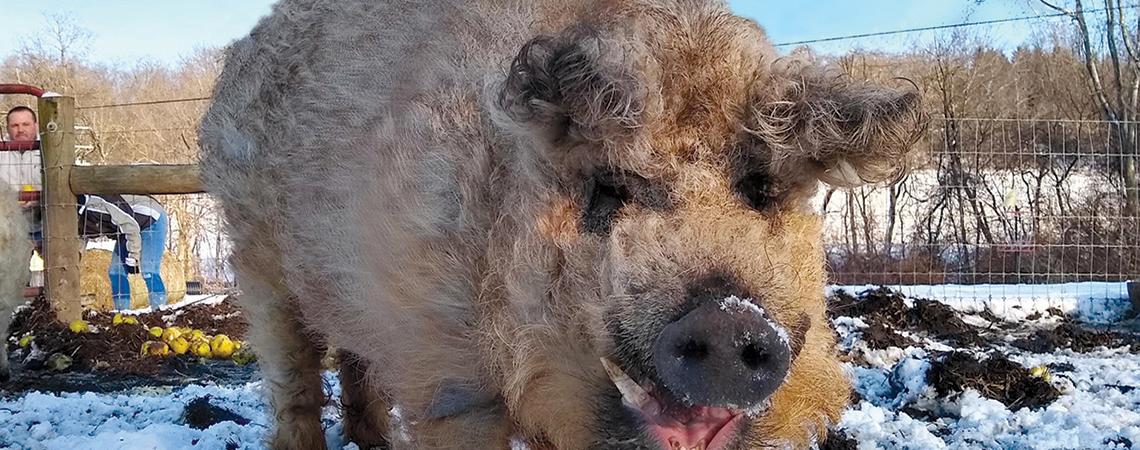On Fridays, Wooly Pig Farm Brewery officially opens at 3 p.m., but by 2:30, friends and neighbors are already sitting down at the natural-edge wooden tables that brewmaster Kevin Ely and his family made from a prodigious elm tree on their property. Young, curly-haired pigs eagerly forage in a pasture above the parking lot, while Herr Fuggle, the farm’s porcine patriarch, snoozes in a pen. Aaron Malenke, Kevin’s brother-in-law and the farmer who tends the pigs, returns from hunting mushrooms just about the time that a food truck starts serving burgers. The first customer to snag a beer is a local woman who cheerily waves to Kevin and his wife, Jael Malenke. “That lady gave me a haircut yesterday,” Kevin says with a grin.
Though only minutes from U.S. 36, Wooly Pig Farm Brewery sits off a windy township road in eastern Coshocton County and seems tucked far away in the countryside. Spread across 90 hilly acres and graced by a red barn built in 1899, it was once a dairy farm owned for more than 150 years by the Norman family. “Aaron and I grew up near this farm,” says Jael. “I remember coming here to sing Christmas carols to the Normans.”
Wooly Pig Farm Brewery
When the farm was for sale in 2014, Jael was finishing her Ph.D. in biology at the University of Utah, and Kevin was the brewmaster and production manager at Salt Lake City’s Uinta Brewing Company. Kevin, who has a brewing science degree from the University of California–Davis, often traveled to Bavaria to obtain equipment for Uinta. While there, he also explored historic farm and village breweries in northern Bavaria’s Franconia region. Photos of Franconia that Kevin sent to Jael reminded her of Coshocton County, but the wooly pigs in the photos really caught her eye. They had remarkably thick, sheep-like hair, and says Jael, “The mamas and their striped piglets looked so cute.”
At the time, Aaron was at Fort Collins where his wife, Lauren Malenke, was studying to be a large-animal veterinarian at Colorado State. They researched the wooly pigs and identified the breed as Mangalitsa, a heritage line developed in Hungary in the 1800s. Although bred to be pasture-raised, wooly pigs are a natural for breweries because they’re partial to spent grain. “On Franconia’s farms,” notes Kevin, “breweries are always beside pig barns because they use the beer-making byproduct for feed.”
The two couples soon realized that the Norman farm offered them a unique set of resources — affordable farmland, plentiful water, and strong family ties in Coshocton County — and jointly purchased it. While Aaron and Lauren revived the farming operation, Kevin and Jael planned the brewery. The first farm animals they acquired were wooly pigs: a boar and three breeder sows named for varieties of hops — Fuggle, Willamette, Galena, and Nugget.
Inspired by Bavaria, Kevin designed the brewery for making lagers, which, according to Germany’s brewing regulations, permit only hops, malt, yeast, and water as ingredients. To maximize production, he installed two boil kettles. In the cold lagering room, extra-large tanks allow for fresh, unfiltered beers with exceptional character and flavor. When Kevin needed additional electricity for the brewery, the cooperative servicing the farm — The Frontier Power Company — proved quite helpful. “Frontier Power gave us lots of good advice,” he says, “and before they ran lines, they were great about asking which trees we’d like to save.” Kevin got to know the linemen then. “Now they come here as patrons,” he says.
While the brewery’s top seller is pale and malty Rustic Helles, Kevin’s repertoire also includes Keller Pils, a hoppy Pilsener, and Rye Dunkel, a full-bodied brown beer. His Maple Sap Cream Ale contains sap supplied by a local Amishman, and in summer, Kevin makes peach and pawpaw beers. “We grow the peaches on the farm,” says Jael, “but my dad gives us the pawpaws.”
In addition to crafting excellent beers, Kevin and Jael have crafted a destination brewery where people from as far away as Cleveland and Pittsburgh come to enjoy the fresh country air, family atmosphere, and unusual wooly pigs. With a nod to social distancing, they’ve recently added individual roofed huts called salettls. “They’re popular in rural Germany for drinking beer outdoors,” Kevin says. Complete with benches and a table, the salettls have made the brewery an even more appealing place to linger over a lager. “Customers think it’s just great to sit in their own space,” says Jael, “and not worry about rain, wind, or sunburn.”
